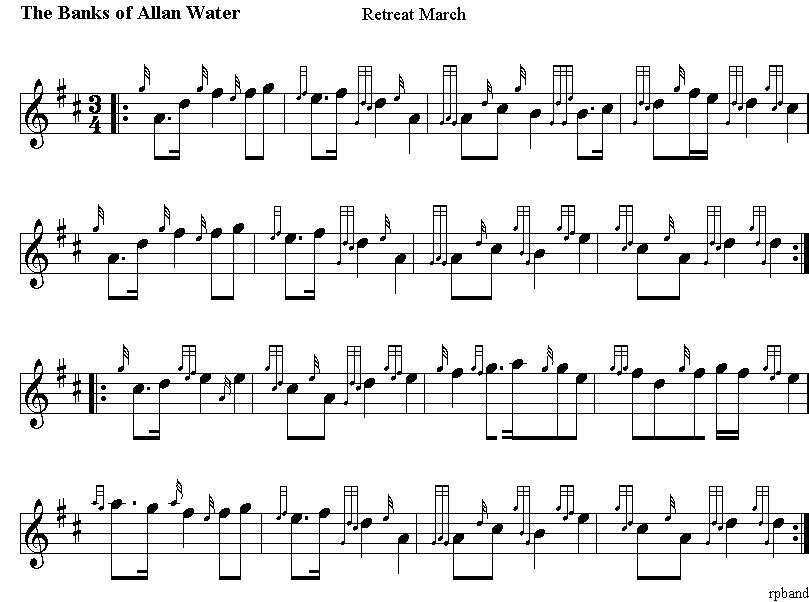|
The Allan
Water is a river in central
Scotland. Rising in the Ochil Hills,
it runs through Strathallan to Dunblane
and Bridge of Allan before joining the River Forth.
Two
broadside ballads refer to the Allan
Water. One is by Matthew "Monk" Lewis
(shown above).
Matthew
Gregory Lewis
(9 July 1775 – 14 May 1818) was an
English
novelist and
dramatist, often referred to as
"Monk" Lewis,
because of the success of his classic
Gothic novel,
The Monk.
Intended for
a diplomatic career, Matthew Lewis spent
most of his vacations abroad to study
modern languages, and in 1794 went to
the Hague as attaché to the British
embassy. Although he only stayed a few
months, it was there that he produced,
in ten weeks, his romance
Ambrosio, or
the Monk,
which was published in the summer of the
following year. It immediately achieved
celebrity for Lewis; but some passages
in the work were of such a nature that
about a year after its appearance, an
injunction to restrain its sale was
obtained. Lewis published a second
edition from which he removed what he
assumed were the objectionable passages,
but the work retained much of its
horrific character. Lord Byron in
English
Bards and Scotch Reviewers
wrote of "Wonder-working Lewis, Monk or
Bard, who fain wouldst make Parnassus a
churchyard; Even Satan's self with thee
might dread to dwell, And in thy skull
discern a deeper hell." The Marquis de
Sade also praised Lewis in his essay
"Reflections on the Novel".
Whatever its
weaknesses, ethical or aesthetic, may
have been,
The Monk
did not interfere with the reception of
Lewis into the best society; he was
favorably noticed at court, and almost
as soon as he came of age he obtained a
seat in the House of Commons as Member
of Parliament (MP) for Hindon in
Wiltshire. After some years, during
which he never addressed the House, he
finally withdrew from a parliamentary
career. His tastes lay wholly in the
direction of literature, and his play
The Castle
Spectre
(1796) enjoyed a long popularity on the
stage.
The Minister
(a translation from Friedrich Schiller's
Kabale und
Liebe),
Rolla
(1797, a translation from August von
Kotzebue), and numerous other operatic
and tragic pieces, appeared in rapid
succession.
The Bravo of
Venice,
a romance translated from the German,
was published in 1804; after
The Monk
it is his best known work. The death of
his father left him with large fortune,
and in 1815 he set off for the West
Indies to visit his estates; in the
course of this tour, which lasted four
months, the
Journal of a
West Indian Proprietor,
published posthumously in 1833, was
written. A second visit to Jamaica was
undertaken in 1817, in the hope of
becoming more familiar with, and able to
ameliorate, the condition of the slave
population; the fatigues to which he
exposed himself in the tropical climate
brought on a fever which resulted in his
death during the homeward voyage. Lewis
held two estates, Cornwall estate in
Westmoreland and Hordley estate in St
Thomas in the East. According to the
slave registers Hordley was co-owned
with George Scott and Matthew Henry
Scott and their shares were purchased by
Lewis in 1817.
Lewis
visited Percy Bysshe Shelley and Mary
Shelley at Geneva, Switzerland in the
summer of 1816 and recounted five ghost
stories which Shelley recorded in his
"Journal at Geneva (including ghost
stories) and on return to England,
1816", beginning with the entry for
August 18, which was published
posthumously.
The Life and
Correspondence of M. G. Lewis,
in two volumes, was published in 1839.
The
Effusions of Sensibility,
his first novel, was never completed.
In this
tune, the lyrics
begin "On
the banks of Allan Water" and proceeds
to relate the story of the death of a
local miller's daughter whose soldier
lover proves untrue.

|



